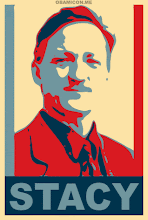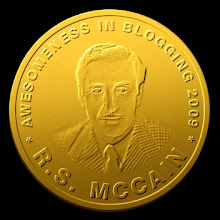Canvassing in urban areas or in public spaces - like metro stops - is very different. There are large public places where people expect to encounter other people, and it's a much friendlier vibe even though and probably because there are crowds.I've had this conversation with lots of young urban know-it-all types (yes, David Weigel, this means you), who argue that Obama's triumph in the Democratic nomination battle bodes great things for November. But it ain't necessarily so.
All of this is to say that walkable neighborhoods and public spaces are very good for politics. As most of the country is suburban, it is very hard to find public spaces where politics can be conducted. Robocalls, TV ads, radio ads, direct mail, and phone banks are all proxies for a lack of civic culture, in which pestering voters with jackhammer-like messaging screaming IRAQ or TAXES takes the place of engaging with people in real conversations. This kind of politics is literally built into the fabric of the suburbs, which is one reason why certain types of authoritarian messaging works really well in both the Democratic and Republican parties.
Democratic primaries are a smaller electorate, and thus the canvassing/phone-banking strategy can make a big difference, especially in a small state. Phone-banking a primary, you're starting with lists of registered Democrats who are at least theoretically open to your progressive pitch. Democratic voters tend to be concentrated in urban "walkable neighborhoods" -- and in apartment complexes and around college campuses -- that make canvassing and GOTV work a lot more practical.
The general election is a different animal. The red states are red for a reason, and people who live in McMansions in Fauquier County, Va., don't want to be bothered by some pierced-and-tattooed Obama volunteer with a clipboard coming up their driveway to ask a bunch of pesky questions.
Look, I know all about the "enthusiasm gap," and I can realize how much Team Maverick suffers from the lack of a grassroots machine. But there are limits to what can be accomplished by the kind of organizational tactics Team Obama employed to such dramatic effect in the primaries, to say nothing of the fact that he won his decisive advantage in caucuses.
Look, David Plouffe keeps talking about Alaska. Why? Because Obama won the Alaska caucus. It's a freaking caucus, OK? When you get into the general election, you're still talking about a state that Bush won by 25 points in 2004. You can do all the phone banks and literature drops you want, but eventually you run up against the reality that you're campaigning in a Republican state, where nearly every home has a gun rack and a vast majority favored drilling ANWR for, oh, the last 15 years or so.
It's the same situation with Georgia. Plouffe can talk about registering new voters until he's blue in the face, and Obama still won't win Georgia. Not going to happen.
And the dadgum thing is, if you're a Democrat, you can look at the 2004 electoral map and see the easiest formula in the world: Hold everything that Kerry won, and flip Ohio.
But because anybody can see that formula -- because it's so blindingly obvious -- pretentious know-it-alls like Plouffe and Axelrod have to come up with this extravagant 50-state idea, just to prove they're so much smarter than everybody else. Which I suppose was impressive in June, when Newsweek said Obama was up by 15 points and Plouffe's Power Point presentation had Eleanor Clift enraptured. But it doesn't look so impressive now, does it?
If there were any grownups left in the Democrat Party, they'd go up to Chicago and whomp some sense into some pumpkin heads: Forget about North Carolina, Georgia, Missouri, etc. Pull your resources out of those marginal states before it's too late, concentrate on trying to hold onto Michigan and Pennsylvania, then flip Ohio and maybe a few other states (e.g., Iowa and New Mexico) that were super-close in 2004.
Should they find themselves defeated after sweating out the final tallies at 2 a.m. Nov. 5, Democrats will look back on all the wasted effort -- I mean, really, what was that Berlin speech supposed to accomplish, anyhow? --and realize that Plouffe and Axelrod blew an election that was easily winnable, if only they had stuck to the basics.













>Pull your resources out of those marginal states before it's too late, concentrate on trying to hold onto Michigan and Pennsylvania, then flip Ohio and maybe a few other states (e.g., Iowa and New Mexico) that were super-close in 2004.
ReplyDeleteBut...that's playing into Karl Rove's hands...